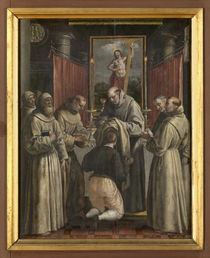The Catholic Defender: Saint Paulinus of Nola
- Donald Hartley

- Jun 20
- 3 min read
Updated: Jun 22
Deepertruth with special permission and aid with Franiciscan Media, a great team for the Lord

Pontius Meropius Paulinus was born c. 352 at Bordeaux, in southwestern France. He was from a notable senatorial family with estates in the Aquitaine province of France, northern Iberia, and southern Italy.
At some time during his boyhood, he made a visit to the shrine of St Felix at Nola near Naples.
Anyone who is praised in the letters of six or seven saints undoubtedly must be of extraordinary character. Such a person was Paulinus of Nola, correspondent and friend of Saints Augustine, Jerome, Melania, Martin, Gregory and Ambrose.
Born near Bordeaux, he was the son of the Roman prefect of Gaul, who had extensive property in both Gaul and Italy. Paulinus became a distinguished lawyer, holding several public offices in the Roman Empire. With his Spanish wife, Therasia, he retired at an early age to a life of cultured leisure.
In 393 or 394, after some resistance from Paulinus, he was ordained a presbyter on Christmas Day by Lampius, Bishop of Barcelona.
The two were baptized by the saintly bishop of Bordeaux and moved to Therasia’s estate in Spain. After many childless years, they had a son who died a week after birth. This occasioned their beginning a life of great austerity and charity, giving away most of their Spanish property. Possibly as a result of this great example, Paulinus was rather unexpectedly ordained a priest at Christmas by the bishop of Barcelona.
He and his wife then moved to Nola, near Naples. He had a great love for Saint Felix of Nola and spent much effort in promoting devotion to this saint. Paulinus gave away most of his remaining property—to the consternation of his relatives—and continued his work for the poor.

Supporting a host of debtors, the homeless and other needy people, he lived a monastic life in another part of his home. By popular demand he was made bishop of Nola and guided that diocese for 21 years.
As bishop of Nola, Paulinus is traditionally credited with the introduction of the use of bells in church services.
Paulinus’ last years were saddened by the invasion of the Huns. Among his few writings is the earliest extant Christian wedding song. His liturgical feast is celebrated on June 22.
Latin poets of the Patristic period, an honor he shares with Prudentius. Paulinus retained much of the style of the old classical poets and composed most of the poems in honor of the feast of St. Felix.

Gregory the Great recounts a popular story that alleges that when the Vandals raided Campania, a poor widow came to Paulinus for help when her only son had been carried off by the son-in-law of the Vandal king. Having exhausted his resources in ransoming other captives, Paulinus said, "Such as I have I give thee", and went to Africa to exchange places with the widow's son.
There Paulinus was accepted in place of the widow's son, and employed as gardener. After a time the king found out that his son-in-law's slave was the great Bishop of Nola.
He at once set him free, granting him also the freedom of all the captive townsmen of Nola. According to Pope Benedict XVI, "the historical truth of this episode is disputed, but the figure of a Bishop with a great heart who knew how to make himself close to his people in the sorrowful trials of the barbarian invasions lives on





















Comments